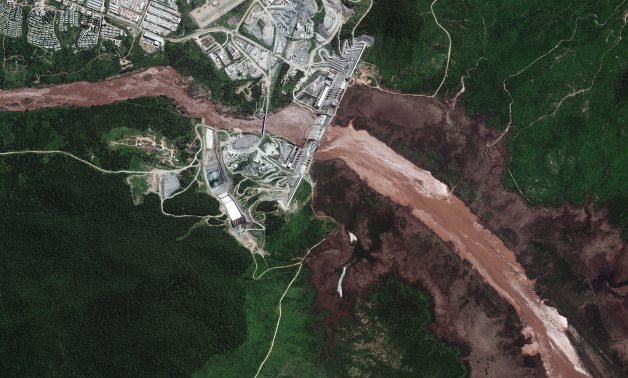
Fie- A handout satellite image shows a view of the Grand Ethiopian Renaissance Dam (GERD) and the Blue Nile River in Ethiopia June 26, 2020. Picture taken June 26, 2020. Satellite image via REUTERS
CAIRO – 25 February 2021: The efficiency of the controversial Grad Ethiopian Renaissance Dam (GERD) is only 30 percent, said Egyptian Minister of Water Resources and Irrigation Mohamed Abdel-Atti in an interview with Al-Watan newspaper on Thursday.
He added that Egypt hadn’t object building of other dams that were established on the Blue Nile by Ethiopia, noting that Ethiopia is unable to produce electricity.
Regarding the Sudanese stance towards the dam’s construction and operation, Abdel-Atti said that Sudan worries because of what happened last year when Ethiopia began filling the dam reservoir without notifying Sudan, adding that Sudan was negatively affected.
“If there were coordination, the crisis would not have been occurred, especially since the filling of the dam last year did not benefit Ethiopia. It was for a political purpose and had no technical goal,” said Abdel Attai.
He explained that Addis Ababa is seeking to fill 13.5 billion cubic meters this year.
In mid-July 2020, Ethiopian authorities unilaterally carried out the first phase of the filling process with 4.9 billion cubic meters; and it is expected that the second phase of the filling would reach 13 billion cubic meters in July.
The dispute among Egypt, Sudan, and Ethiopia dates back to May 2011 when Ethiopia started building the dam; Egypt voiced concern over its water share [55.5 billion cubic meters].
As Democratic Congo is chairing the AU for the year 2021, it is attempting to revive stalling negotiations between Egypt, Sudan, and Ethiopia.
Coordinator of the Congolese unit in charge of African Union (AU) affairs, Professor Alphonse Ntumba, visited Egypt Wednesday to discuss the issue of the GERD.
In 2015, the three countries signed the Declaration of Principles, per which the downstream countries should not be negatively affected by the construction of the dam.
In October 2019, Egypt blamed Addis Ababa for hindering a final agreement concerning a technical problem, calling for activating Article No. 10 of the Declaration of Principles, which stipulates that if the three countries could not find a solution to these disputes, they have to ask for mediation.
Washington had brokered tripartite negotiations among the three countries, in the presence of the President of the World Bank (WB) starting from November 6, 2019 until February 27 and 28, 2020.
During these rounds of talks, tangible outcomes were agreed on among the three parties concerning the rules and mechanism of operating the dam and the filling process of the reservoir during drought and prolonged drought; however, an agreement was not sealed.
Constructions in the Grand Renaissance Dam started on April 2, 2011 at a cost of $4.8 billion. The dam is located on the Blue Nile with a capacity of 74 billion cubic meters, and is expected to generate up to 6,000 megawatts of power.

Comments
Leave a Comment